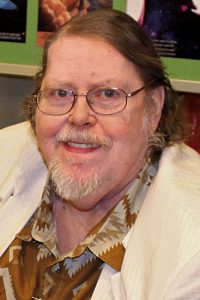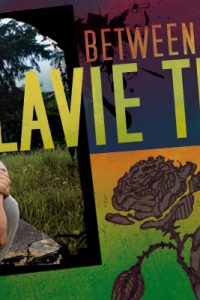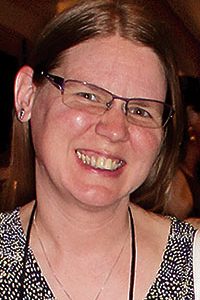Robert J. Sawyer: Mapping the Future
 Robert J. Sawyer was born in Ottawa, Canada. His family moved to Toronto when he was a baby, and he has lived there ever since.
Robert J. Sawyer was born in Ottawa, Canada. His family moved to Toronto when he was a baby, and he has lived there ever since.
Sawyer sold a few SF stories in the ’80s, beginning with ‘‘If I’m Here, Imagine Where They Sent My Luggage’’ for The Village Voice (1981), gradually transitioning to a career as a full-time SF writer in the early ’90s. Sawyer’s short fiction includes Aurora Award winners ‘‘Just Like Old Times’’ (1993), ‘‘Peking Man’’ (1996), ‘‘Stream of Consciousness’’ (1999), ‘‘Ineluctable’’ (2002), and ‘‘Biding Time’’ (2006); ‘‘You See But You Do Not Observe’’ (1995), winner of France’s Grand Prix de l’Imaginaire; Hugo finalists ‘‘The Hand You’re Dealt’’ (1997) and ‘‘Shed Skin’’ (2004); Hugo, Nebula Award, and Aurora finalist ‘‘Identity Theft’’ (2005); and Bram Stoker Award finalist ‘‘Fallen Angel’’ (2000). His short work has been collected in Iterations (2002), Aurora winner Relativity: Essays and Stories (2004), and Aurora finalist Identity Theft and Other Stories (2008).
First novel Golden Fleece (1990) won an Aurora Award. Other novels include the Quintaglio Ascension trilogy Far-Seer (1992), Fossil Hunter (1993), and Foreigner (1994); End of an Era (1994), which won Japan’s Seiun Award; Aurora and Nebula Award winner The Terminal Experiment (1995); Aurora winner Starplex (1996); Seiun winner Frameshift (1997); Illegal Alien (1997); Factoring Humanity (1998); Aurora winner Flashforward (1999), later made into television series FlashForward (2009-2010); and Calculating God (2000). His Hugo-winning novel Hominids (2002) began his Neanderthal Parallax trilogy, continuing with Humans (2003) and Hybrids (2003). John W. Campbell Memorial Award winner Mindscan (2006) and Rollback (2007) form his ‘‘transhumanist pair,’’ about uploading human consciousness and extending human lifespans, respectively.
His latest series is the WWW trilogy: Aurora winner Wake (2009), Watch (2010), and the forthcoming Wonder (2011).
Sawyer has also edited numerous anthologies, including volumes of Canadian SF/F/H and mystery fiction; is a frequent speaker at conferences, conventions, and festivals; and often teaches at writing programs. He edits a science fiction imprint, Robert J. Saywer Books, for Red Deer Press. He has been married to poet Carolyn Joan Clink since 1984. They live in Mississauga, Ontario.
Website: www.sfwriter.com
 ‘‘The notion of the World Wide Web gaining consciousness had been at the back of my mind because of those one-liners you see in pop-science magazines: ‘At some point early in the 21st century, the World Wide Web will have more interconnections than the human brain does.’ You file things like that away. One of the things that compelled me to write my trilogy Wake, Watch, and Wonder is the thought (or question) that at some point machine intelligence will exceed human intelligence. Unless you are of a religious bent and think there’s something magical about human intelligence, you have to accept that at some point it’s going to be replicable, and then exceedable, on another substrate.
‘‘The notion of the World Wide Web gaining consciousness had been at the back of my mind because of those one-liners you see in pop-science magazines: ‘At some point early in the 21st century, the World Wide Web will have more interconnections than the human brain does.’ You file things like that away. One of the things that compelled me to write my trilogy Wake, Watch, and Wonder is the thought (or question) that at some point machine intelligence will exceed human intelligence. Unless you are of a religious bent and think there’s something magical about human intelligence, you have to accept that at some point it’s going to be replicable, and then exceedable, on another substrate.
‘‘In college, I did a minor in psychology, and through the years that I studied psychology, never once was the word ‘consciousness’ mentioned. At that time (I started in ’79), we were coming off the tail end of B.F. Skinner and Behaviorism. There was no scientific notion of consciousness. It was a black box: inputs go in, outputs come out. This always intrigued me because, as somebody who was writing fiction, I was doing what William James had called ‘the stream of consciousness’: trying to capture a process that clearly had depth and reality to it. Of course, since I graduated the science of consciousness has become very interesting – interesting for me in the same way that science fiction is interesting.”
…
 ‘‘A big part of writing science fiction convincingly, if it’s hard SF, isn’t just getting the science right but getting the atmosphere of science right: the politics of science, the culture of science, and what scientists are really like. In summer 2009, I was lucky enough to have a position created for me as Writer in Residence at Canada’s national synchrotron facility – the Canadian Light Source – in Saskatoon, Saskatchewan. They gave me an office right on the main floor, full access to the facility, and I could spend two months talking with the experimenters, working on the experiments, doing whatever I wanted to do. I was also hanging out with them in the lunchroom, going to their houses in the evening, going out to whatever movies they wanted to watch. That was an immersion, which will bring an enormous level of verisimilitude to all the books I do subsequently.”
‘‘A big part of writing science fiction convincingly, if it’s hard SF, isn’t just getting the science right but getting the atmosphere of science right: the politics of science, the culture of science, and what scientists are really like. In summer 2009, I was lucky enough to have a position created for me as Writer in Residence at Canada’s national synchrotron facility – the Canadian Light Source – in Saskatoon, Saskatchewan. They gave me an office right on the main floor, full access to the facility, and I could spend two months talking with the experimenters, working on the experiments, doing whatever I wanted to do. I was also hanging out with them in the lunchroom, going to their houses in the evening, going out to whatever movies they wanted to watch. That was an immersion, which will bring an enormous level of verisimilitude to all the books I do subsequently.”
…
‘‘I’m liberal even by Canadian standards, and Heinlein was conservative even by American standards, so there’s a light-year between us. The guy I think of myself as most similar to – in terms of trying to accomplish things, not stylistically – is Kim Stanley Robinson. Like me, I think, Stan is totally of the H.G. Wells school of science fiction: that it is a medium for social commentary. I think my trilogies are a little more action-packed than Stan’s utopias, but they are utopian! The absolute goal is to have them be optimistic roadmaps for the future.
‘‘I think the human race is going to have a great future, but I do worry about the future of novelists. People quit their day jobs to become a writer, but the harsh reality is that it’s easier to sell your first novel than your fifth. With your first, you might be (as I like to say) the next Isaac C. Heinlein. By the fifth, they know you’re not, so why bother giving you a raise? They’ll go get somebody new, and try another lottery ticket.”


 Excerpts from the interview:
Excerpts from the interview:



Pingback:Tweets that mention Locus Online Perspectives » Robert J. Sawyer: Mapping the Future -- Topsy.com
Pingback:Geek Media Round-Up: January 13, 2011 – Grasping for the Wind